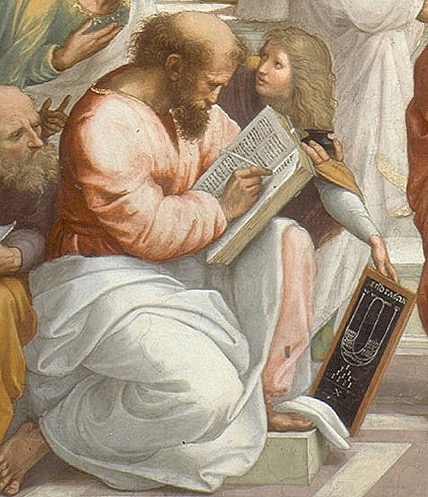LongDivision

Raphael: The School of Athens fresco, Cropped Image of Pythagoras (1509)
"… our well-being might more depend upon how well we divide."
The Muse and I tried listening to the radio as we drove back home following the 9/11 attacks. We'd been setting up for another workshop at The Los Alamos National Laboratory when the news started filtering in. The participants at first opted to continue with the session, since we could do nothing about those distant events, but shortly thereafter, armored Humvees with mounted fifty caliber machine guns began circulating through the streets and orders came down for everyone to evacuate the mesa. We cowered overnight with friends before the rental car agency extended an offer for us to just drop off the car at the airport we'd flown out from a few days previous, waving the usual drop charges. The radio, sometimes a useful distraction on long drives, proved discouraging then. In lieu of the news we'd hoped to receive, only propaganda spewed, the most vile and vindictive speech, saber-rattling on steroids. We quite understandably wondered what country we were passing through.
That evening, we overnighted in Mt. Crested Butte, Colorado, the town where The Muse and I first met. There, we took part in a most moving candlelight march down that small main street, tears of sorrow and compassion streaming down every marcher's face. This was a place where we felt like we belonged after a long day wading through hostile territory. More hostile territory would come as we wended our way down off the Continental Divide and up through Utah, where more right wing wrong-headed broadcasts awaited us as we HeadedHomeward toward a home that suddenly seemed less safe haven than it had a few days before. We watched over succeeding weeks while our country set about formalizing what became an extended war on itself. We protested in the streets to little effect as farm boys peeled rubber in their pickups while screaming that we were communists.
We were actually more communalists than card-carrying communists, but our actions clearly placed us on the far side of some widening divide. That rift had predated our arrival. It had been designed into our Constitution, which unlike our original Articles of Confederation, was deliberately designed to recognize and attempt to balance strongly opposing forces. Those Articles, crafted with the explicit expectation that states would virtuously cooperate, had proven disastrous in practice as expected virtue evaporated in its presence. The second draft, crafted by Madison, took a more jaded view of human relations, and sought to balance powers and punishments. The United States has been in constant contention ever since. Most find themselves born on one side or another. Little explicit explanation needs exchanging. We just know. Our values and perspectives grow out from there, whichever rootstock we'd acquired. We continually speak of coming together just as if we'd ever really been one nation, under God, and indivisible. We were always divided.
We've had our moments when we seemed to draw closer. External threats used to draw us together, or so we tell ourselves, but history's footnotes suggest that's never happened. Considerable coercion came into play, squelching some speech and forcing others to just go away and cower somewhere else until the hostilities subsided. HeadingHomeward, I sense that great divide, the LongDivision. I know which side of town we'll be inhabiting and I know for certain that many there hold principles I cannot countenance. Hate speech seems more common and less circumspect there, where many seem politically still stuck somewhere in the mid-nineteen-fifties. The local radio station spews venom 24/7, owned by some so-called conservative conglomerate insistent upon reprogramming listeners to expect and tolerate hate speech instead of news or music. Confederate raiders, America's original domestic terrorists, settled there following the Civil War. They brought more than their household belongings with them.
I have never felt as though I was a full citizen of any place I've ever lived. I found myself living on the other side of some set of railroad tracks, partially disenfranchised by someone holding more power or authority. We maintain these fantasies of who our better angels must be, we hold them self-evidently, and every one of us insists that we're dedicated to the concept of liberty, if not precisely the practice. Our Founders believed that a right could not properly infringe upon anyone—well, upon any land-owning white man—and they enumerated only a few, like: life, liberty, and the pursuit of happiness, whether or not happiness was ever actually achieved. Over time, certain privileges took root and squeezed some rights out. We've always had a few who thought nothing of discriminating against some despised other. Over time, our identity grew into a definite split personality, paranoid as well as welcoming. We wear Janus masks as citizens of these "united" states.
Along about fifth grade, LongDivision's introduced. It serves as perhaps the first great dividing point in a young student's awakening, for it cannot be mastered by simple intuition. It requires some serious programming, and some take to it while others seemingly can't. Those who can't won't advance through higher education. They'll become the janitors and mechanics, line workers and fast food jockeys. Those who master LongDivision face subsequent masteries between there and any profession, carefully programmed every step of that way. The resulting world views seems destined to further divide. Those with LongDivision usually graduate with a fuller citizenship than those without it. They inhabit a different nation, one where the LongDivision might seem less absolutely divisive. Rather than speaking of coming together, our well-being might more depend upon how well we divide.
©2021 by David A. Schmaltz - all rights reserved


